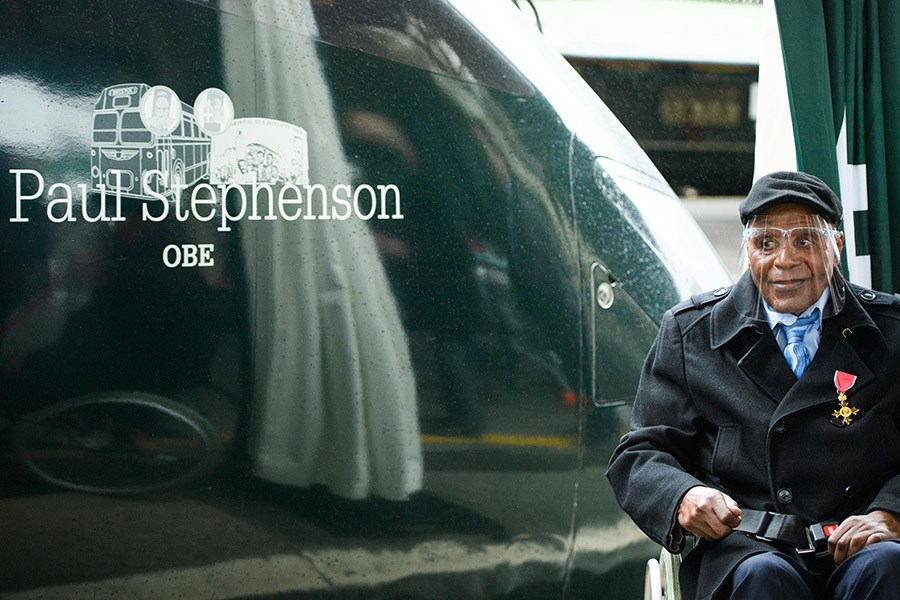
Bristol civil rights activist has GWR train named in his honour
Great Western Railway celebrates Black History Month Civil rights pioneer Dr Paul Stephenson today had a train named in his honour as Great Western Railway celebrated Black History Month.
Great Western Railway celebrates Black History Month
Civil rights pioneer Dr Paul Stephenson today had a train named in his honour as Great Western Railway celebrated Black History Month.
Train operator GWR hosted a naming ceremony at Bristol Temple Meads to pay tribute to a lifetime spent campaigning for civil rights for the British African-Caribbean community.Train tribute: Dr Paul Stephenson alongside IET 800036.
Dr Stephenson, 83, was awarded an OBE in 2009 ‘for his services to equal opportunities and to community relations in Bristol’ and in 2017 received a Pride of Britain Award for Lifetime Achievement.
He was nominated for the train naming by the public and GWR colleagues as part of GWR’s Great Westerners campaign, recognising past and present heroes from across the network.
Others to be celebrated on GWR’s Intercity Express Trains include Her Majesty Queen Elizabeth II, Bristol paramedic Kathryn Osmond, who fought tirelessly to raise awareness of the skin cancer melanoma, Fleur Lombard, the first female firefighter to die on duty in peacetime Britain, and George ‘Johnny’ Johnson, the last surviving British member of the Dambusters raid.
Learn more about GWR’s #greatwesterners named trains.
Dr Stephenson, whose name features on train 800036, said:
“This is such a wonderful gesture and one I’m delighted to accept. I feel very proud to be considered by GWR as one of its Great Westerners.
“History is very important for understanding who we are, what’s happening to us today and where our vision is for tomorrow. It is vital to take ownership of our history and to revisit it from time to time to ensure we have a clearer picture of our time and understanding of our humanity.”
Co-Chair of GWR’s REACH Network (Recognising Ethnicity and Cultural Heritage), Jean Cook and Anthony Chitomera, said:
“It is with great pride that we have honoured Paul Stephenson OBE. As a BAME staff network within GWR, REACH was keen to recognise his lifelong tenacity in knocking down obstacles to equality, inclusion and representation in the workplace.
“His courage and determination changed the way we all live for the better. It is our duty to continue his efforts, recognising his work through our deeds. Reaching for a better future for all.”
Mayor of Bristol Marvin Rees, who alongside Dr Stephenson was this month named in a book honouring 100 Great Black Britons, said:
“Dr Paul Stephenson has been dedicated to fighting for equality and civil rights for more than 60 years and I’m delighted that Great Western Railway should choose to honour one of our greatest Bristolians in this way.
“Black History Month gives us an opportunity to celebrate Black contributions to British society and it is fitting that GWR will be adding Dr Stephenson to the list of those Great Westerners whose names adorn its trains.”
Born in Essex to a West African father and a British mother, Dr Stephenson served in the RAF before moving to Bristol in 1960 and becoming the city’s first black social worker.
In 1963 he led a boycott of the Bristol Omnibus Company, protesting its refusal to employ Black or Asian drivers or conductors. After a 60-day boycott supported by thousands of Bristolians, the company revoked its colour bar.
First West of England Managing Director, James Freeman, said:
“I am delighted to see Dr Paul being recognised in this way for his supremely important achievements. Today I am proud that within our own team, we have a relative of one of the successful protestors who campaigned with Paul to eradicate the systemic discrimination against black and minority ethnic people that took place by the operators who owned and managed the bus companies during that dreadful period of history.”
In 1964 Dr Stephenson achieved national fame when he refused to leave a public house until he was served, resulting in a magistrates’ court trial which was dismissed.
Dr Stephenson’s campaigns were instrumental in paving the way for the first Race Relations Act in 1965. He later worked for the Commission for Racial Equality in London and in 1975 was appointed to the Sports Council, campaigning prominently against sporting contacts with apartheid South Africa.
On his return to Bristol in 1992 he helped set up the Bristol Black Archives Partnership (BBAP), which protects and promotes the history of African-Caribbean people in Bristol.
In 2007 he was granted Freedom of the City of Bristol. The citation stated:
“Paul Stephenson has devoted his life to improving race relations and encouraging community involvement and is a founder member of the Bristol Black Archives Project which has contributed greatly to an understanding of the history of the city and has helped to build closer relations between all the communities of Bristol.”
With more people starting to use trains again operators are reminding passengers to:
- plan ahead – travel at quieter times where they can, buy a ticket online and in advance, and book ahead if you need travel assistance
- consider others – wear a face covering unless you’re exempt, not travelling if you have Covid symptoms and consider others, not all disabilities can be seen
- stay safe – maintaining your distance wherever possible; wash your hands and carry hand sanitiser, paying contactless where you can
Notes to editors
Great Western Railway (GWR) provides high speed, commuter, regional and branch line train services. We help over 100 million passengers reach their destinations every year - across South Wales, the West Country, the Cotswolds, and large parts of Southern England.
We’re currently seeing the biggest investment in the network since Brunel so we can offer more trains, more seats, and shorter, more frequent journeys and continue the network’s heritage of helping connect more businesses to new and prosperous markets. Through a series of initiatives we aim to be a good neighbour to the communities we serve and are committed to making a positive social impact in those regions. Learn how we're Building a Greater West at GWR.com. GWR is a FirstGroup company.
First West of England is part of First Bus. Today a plaque at Bristol Bus Station commemorates the efforts of the brave and committed Bristolians who campaigned against the colour bar on the city’s buses in 1963. You can read more about the unveiling of the plaque and the history of the Bristol Bus Boycott here.
